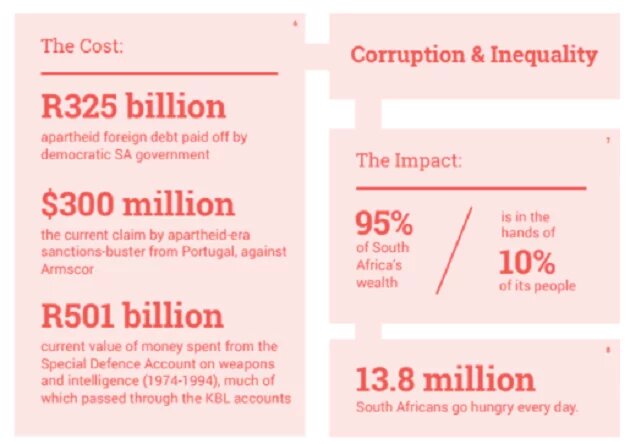Crimes of the "rich, powerful and politically well-connected" in South Africa, beginning Saturday, will come under intensified scrutiny as civil society groups rally to 'join the dots' in the country's story of capture and plunder.

Organisations including Open Secrets, Corruption Watch, Right2Know and the Public Affairs Research Institute (PARI) have organised public hearings with the explicit aim of hearing evidence related to corruption and economic crimes over the last 40 years.
The People's Tribunal on Economic Crime, running from 3-7 February in Johannesburg, is the first in the world to specifically address crimes of corruption and theft, partly in response to the 'unwillingness or incapacity' of state to ensure justice for known crimes, organisers say.
Central to their objective, they say, is to challenge simplified narratives of corruption which might either counterpose public and private sector corruption, or hone in on apartheid theft or 'current' state capture only.
Rather, the ways in which South Africa -- at the expense of ordinary people -- became and remained the site of extensive and mammoth plunder requires much greater efforts at 'joining the dots' between past and present (as well as public and private) economic crimes, organisers say.
'Unfinished business of the TRC'
Yasmin Sooka, executive director of the Foundation for Human Rights and an adjudicator for the Tribunal, told HuffPost she believes the Tribunal will be an important moment in the history of South Africa.
It's primary purpose, she said, is to "expose truth" and to deepen public understanding of how and where capture, corruption and pillage have happened, and specifically the continuities between the past and present.
While the ongoing parliamentary inquiry into state capture -- with particular focus on SOEs including Eskom -- have made major strides in exposing alleged theft and abuse of office, Sooka said this is just the first step in exposing the extent of the 'rot'.
One of the commissioners of the Truth and Reconciliation Commission in the 1990s, Sooka said part of the "unfinished business" of the TRC is to understand how the structural dimensions of apartheid gave rise to grand corruption during that period which continued into the post-1994 period, most iconically in the form of the Arms Deal.
Looking back, however, goes beyond a quest for justice for past crimes through retribution, potentially in the form of criminal prosecution, she implied.
"We need to understand these patterns [of capture, corruption] at... an institutional level" to ensure it can be eliminated from society, she said.
Reclaiming mega-riches stolen from the South African purse is also an ultimate objective, she added, making reference in particular to businesses -- through apartheid into democracy and often with the help of the state -- that have profited from pillage.
"I have two slogans: it's now or never for South Africa," she said, "...and the other is 'bring back the money', because when you look at the massive amounts that have been [siphoned over decades], it could pay for fees of students... uplift and benefit people in our society who need it urgently".
'Sustain the conversation on corruption'
In addition to sustaining and raising the conversation on corruption in the country, co-orgainsers Right2Know told HuffPost the Tribunal will emphasise hearing "different voices, analyses and perspectives" on corruption.
"Everytime we listen to the conversation on TV, we hear "experts" and not people in our communities," said Mluleki Marongo, R2K's Access to Information Organiser. The Tribunal will "connect Apartheid crimes, the Arms Deal and State Capture in one single conversation," and amplify voices and experiences excluded from mass coverage, he said.
Marongo said the goal is not only to raise the debate and embolden citizen action against corruption, but also to put pressure on law enforcement agencies to act.
"A sluggish attitude from government [on prosecution] has given birth to a need for a People's Tribunal in which ordinary South Africans offer the country a glimpse into a model of how economic crimes could be dealt with or at the least offer inspiration to the government to pursue economic crimes," he said.
The People's Tribunal on Economic Crimes (Arms Trade Hearings) will take place from 3-7 February at Constitution Hill, Johannesburg. HuffPost will report from the Tribunal.
___
This article first appeared on the Huffington Post - http://www.huffingtonpost.co.za/2018/02/01/peoples-tribunal-to-open-flo…;